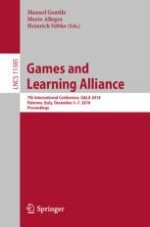2019 | OriginalPaper | Chapter
ALF - A Framework for Evaluating Accelerated Learning and Cognitive Skills Development in Industry Through Games
Authors : Sobah Abbas Petersen, Manuel Oliveira, Kristin Hestetun, Anette Østbø Sørensen
Published in: Games and Learning Alliance
Publisher: Springer International Publishing
Activate our intelligent search to find suitable subject content or patents.
Select sections of text to find matching patents with Artificial Intelligence. powered by
Select sections of text to find additional relevant content using AI-assisted search. powered by
